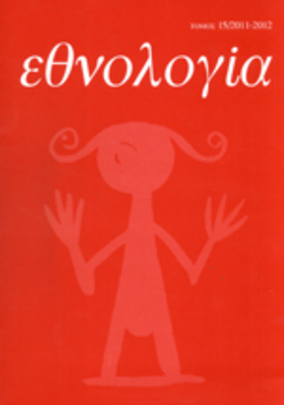Η παράδοση στη διαδικασία της ιστορικής διαπραγμάτευσης της εθνικής και τοπικής ταυτότητας : η περίπτωση της φουστανέλας
Part of : Εθνολογία : περιοδική έκδοση της Ελληνικής Εταιρείας Εθνολογίας ; Vol.4, No.1, 1995, pages 127-150
Issue:
Pages:
127-150
Parallel Title:
The tradition in the process of the historical negotiation of national and local identity
Author:
Abstract:
In this paper I examine the tradition more as a form of the historical process than as a form of what we would call structure. In general terms, it is suggested that tradition has an action into the process of the historical «negotiation» of the national identity. As a methodological instrument to the presentation and analysis of the above subject I have used the cultural biography of a material object I have used the cultural biography of a material object, namely of the «foustanela». This clothing has evolved in a constituent part of the modem Greek tradition and of the symbolic rhetoric of the national identity. In the first part of this paper a mention is made to the inadequate research into material culture, as a field of the folklore studies. Next emphasis is laid on the significance of the historical-antrhopological perspective and analysis of the material culture. In combination with the method of the cultural biography it is pointed out that the «foustanela» was not a popular costume before the war of independence and moreover it was not connected with the national image and identity of the Modem Greek. The iconographie and historical sources outline as a popular dress, the «poucamissa», a simple knee high clothing that, in a lot of local variations, dressed the nationally dissimilar rural and pastoral groups which were moving in the Balkan mountains. It is pointed out also that the clothing of the rural - pastoral groups has been developed in the known «foustanela». Moreover, our datta enable us to connect the «foustanela», or the previous form of poucamissa, with the development of the klephtes-armatoloi phenomenon and generally with that of the social bandits. In this frame «foustanela» constituted the social practice and the symbolic expression of an attitude and a culture of «rebellion» that had been emerged in the specific conditions of the 18th-l 9th centuries. However, from the begining of the 19th century «foustanela» junctions as an expressive language of a gradually liberating consciousness which transcended the national and the other divisions. Finally the «foustanela» functions as an expressive language of a gradually liberating consciousness which trasneended the national and the other divisions. Finally the «foustanela» was recognized as a Greek national costume and although it was partly an invented tradition (in relation to the origin, the naming, the morphology etc.) it became a symbol of the Greek national identity and an object of the collective action. A lot of factual evidence shows the process of the transformation of the initially supemational dress of «rebellion» into the Greek national costume. Futhermore in this paper the action of the tradition (of the «foustanelas» in the present case) is dedected in a different level of the gradation of the identity. It is pointed ot that a local identity was also constructed without this identity to disrupt the national one. Agrinio was based on the totally different social- economical and cultural status of its new residents. In order to be ensure the internal cohesion of the local society it was recalled selectively this form of the tradition which was reffered to the social practice and moreover to the symbolic rhetoric of the rebellion culture. In this way «foustanela» is getting something from the semantic content of the pre-national costume. Agriniotes - Roumeliotes generally- are constructing their local identity laying weight on some different contents and levels of the tradition. In their context this rhethoric differentation seems to include an attitude of a «complementery» opposition to the dominant authority, ideology and culture.




